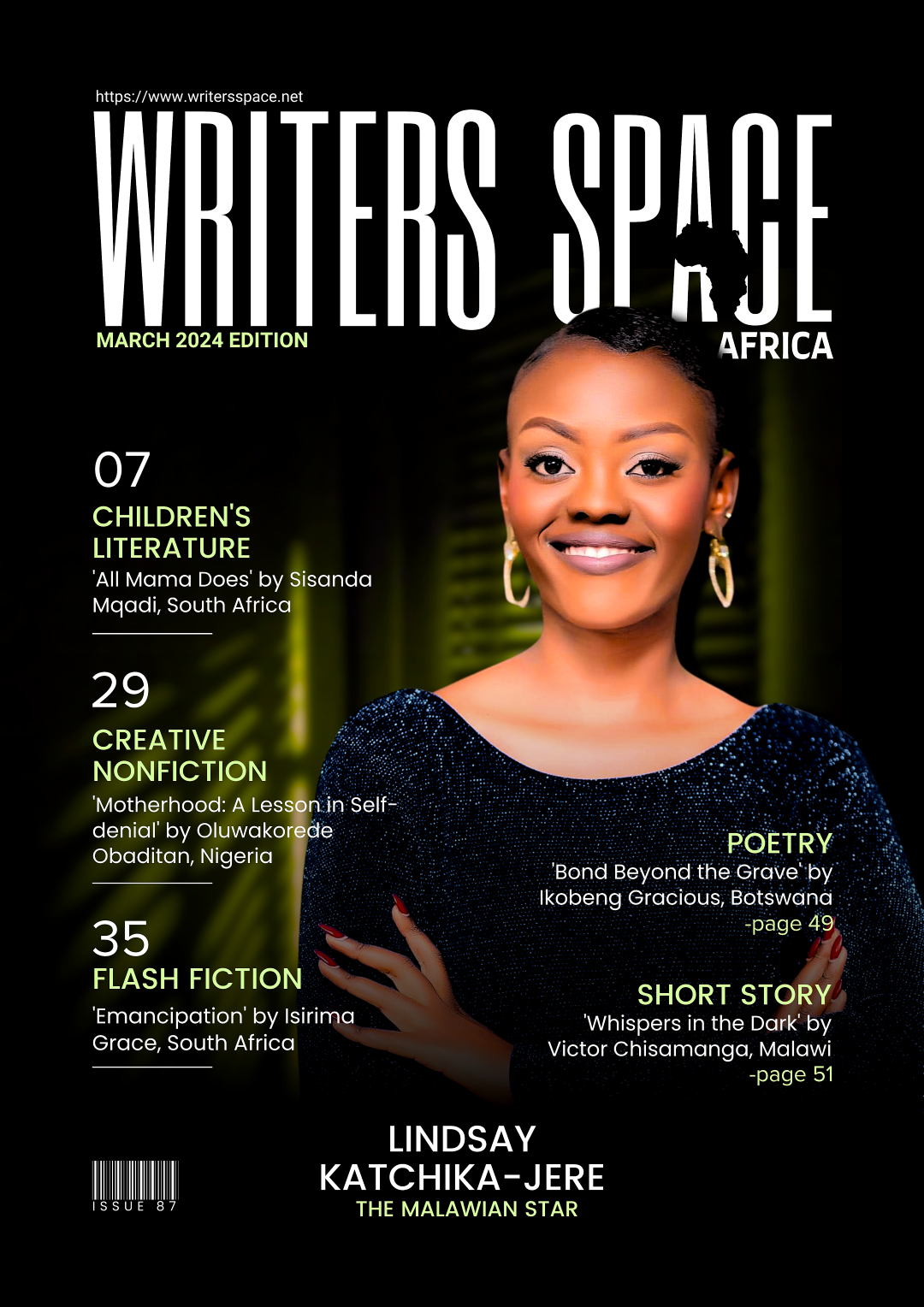In this edition, Lise Nova Berwadushime interviewed Lindsay Katchika-Jere, the first runner-up of the Wakini Kuria Prize for Children’s Literature 2023.
————-
 Lise: Hello, Lindsay, it’s a pleasure to have you. Please tell us about yourself.
Lise: Hello, Lindsay, it’s a pleasure to have you. Please tell us about yourself.
Lindsay Katchika-Jere: I am Lindsay Katchika-Jere, a Malawian children’s author of four books who was born in 1999. My first book ‘The Missing Meteorite’ aims at promoting child participation, museum science education and girl child education. My short stories have also been published on various platforms including local newspapers and magazines. I hold the title of ‘Internationally Published Author’ as two of my works have been published in an anthology in Nigeria and America.
Lise: That’s lovely.
Lindsay Katchika-Jere: Thank you. The other thing I can tell you is that in September of 2022, I compiled the anthology ‘Outlive the Labels Volume IV’ to empower other women writers, the anthology later became an amazon best seller! I am also a member of Malawi Writers Union and Young African Leaders Initiative (YALI) Network. I have a first-class honors degree in Mass Communication from African Bible College which is in Lilongwe-Malawi.
Lise: Wow! I can recognize greatness when I see it.
Lindsay Katchika-Jere: I’m humbled
Lise: By the way, when did you start writing?
Lindsay Katchika-Jere: I started between 7 and 8 couple of years after my parents divorced. It was my way of escaping loneliness. I started with poetry then fairytales.
Lise: Oh! I’m sorry about that. So basically, we can say that loneliness and trying to find a way out were what inspired you to write, right?
Lindsay Katchika-Jere: Yes. Exactly! The power of storytelling as well: I noticed that there’s a lack of representation of African stories especially Malawian stories. I grew up reading Cinderella etc. The only African stories I read were Kenyan or Nigerian. That’s why most of my stories have a Malawian touch so that I can share our stories with a bigger audience in a whimsical and relatable way. In addition, most Malawian children’s stories I came across communicated death, hunger poverty, being orphaned etc. As much as it could be the reality but it doesn’t motivate children to read or write. It doesn’t allow for imagination and dreams.
Lise: Wonderful. You gave voice to Malawian children’s stories. Now tell me, are all of your four books children’s stories?
Lindsay Katchika-Jere: Yes.
Lise: Lindsay, allow me to ask this question specifically. Why do you write for children?
Lindsay Katchika-Jere: I write for children because in my country, there’s a problem of illiteracy. A lot of children don’t know how to read. You can find secondary school children who don’t know how to read so, one of my motivations to start writing for children even though I got a lot of discouragement from people was to offer a helping hand in addressing that problem. You know, I come from a developing country and my parents would rather buy chicken for dinner than buying a book. When I started writing I wasn’t really looking for money
I remember when I published my first book, I didn’t care about how many copies I was going to sell. I simply considered it my way of giving back to my community.
Lise: I see.
Lindsay Katchika-Jere: Another thing is, writing for children is just fun. I grew up in a very traumatic place like, I didn’t come from a best environment. So, when I write for children sometimes, I go to a place where I have never been. Sometimes I write a story about a child in a village… I’ve never been to village but through writing I travel there. That way also, children get to experience different environments through my books in an interesting and funny way. I like to mix a bit of reality and whimsical tales.
Lise: Wow! I feel you. Your “why’s” are stronger!
Mixing reality and imagination is what I saw in the story that won. “The Hair Whisperer” was an amazing story for real
Lindsay Katchika-Jere: Thank you!
Lise: You’re welcome. Now, let’s talk about the Wakini Kuria Prize for Children’s Literature. Please share with me some of the feelings you had when you became the second runner-up of the Wakini Kuria Prize for Children’s literature.
Lindsay Katchika-Jere: When I became a runner-up of the Wakini Kuria prize for Children’s literature I was very excited because you know, I have been following African literature. I had been following the conference for a very long time I think it’s maybe for a whole year. Then I thought I should be able to submit a story one of these days. When the theme was launched, I said “this is my time…this is something I could go for”.
Then I started crafting my story and I sent it to two people to review it then I sent it, praying that something good comes out of it. I was shortlisted then I was so excited. You know, sometimes you doubt yourself as a writer but winning that was a sign for me that writing is my thing after all.
Lise: Congratulations once more, Lindsay. Now tell me, what’s your way forward? I mean, what should we expect from you in your writing career?
Lindsay Katchika-Jere: I’m coming up with two books this year. I don’t really know the exact dates I’ll launch them but I will surely publish them.
I’m also trying to venture into international platforms because I’ve been self-publishing since I wrote my first book.
Again, I have been writing children’s picture books. You know, what I liked about that competition was that it stretched my mind and made me find out that I was comfortable writing in a different style. My books and the story which won are a little bit different so basically, the competition taught me more about myself and what I can write comfortably. People should expect from me more books and fun stories about Africa.
I’m also hoping to impact many young writers and this year, I have a few plans to do that via reaching out to primary school students and helping in nurturing their writing talents.
Lise: Good luck with that. Anyway Lindsay, is there anything you do apart from writing?
Lindsay Katchika-Jere: Well, apart from writing, I do charity activities. I am the founder and director of a charity organization called The Sprout Foundation.
Lise: That’s awesome. Before we end this session, is there anything else you would like to say?
Lindsay Katchika-Jere: I really want to thank the organizers of the Wakini Kuria Prize for Children’s Literature and AWC for motivating writers by providing a rare platform for African writers to put their stories out there. I also would like to invite people to support them since they are doing a good thing. I also suggest the organizers to encourage more young African writers because sometimes one looks down on their stories depending on where they come from, yet I think stories are so powerful that one would be surprised by the number of people who may like theirs if they were to share them.
Lise: Thank you so much for your precious time, Lindsay.
Lindsay Katchika-Jere: Thank you too for having me.
Read – Chantelle Chiwetalu – Winner of the 2023 Wakini Kuria Prize for Children’s Literature







